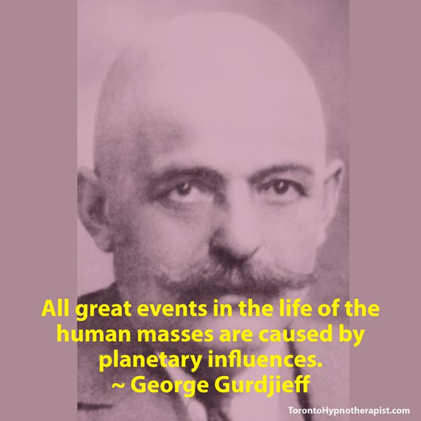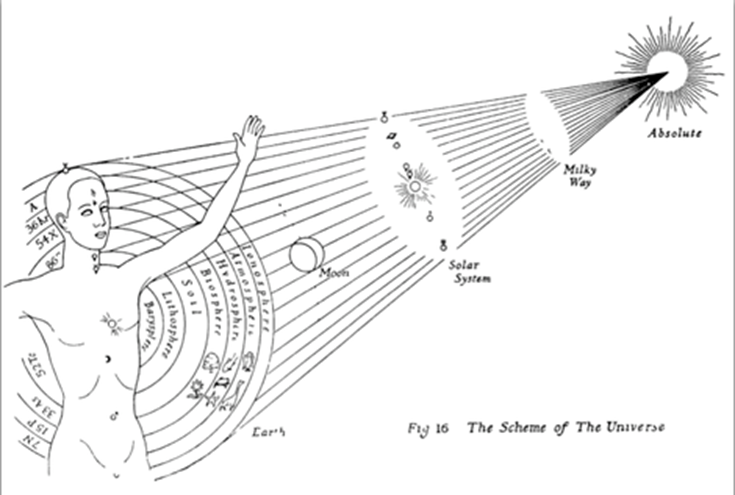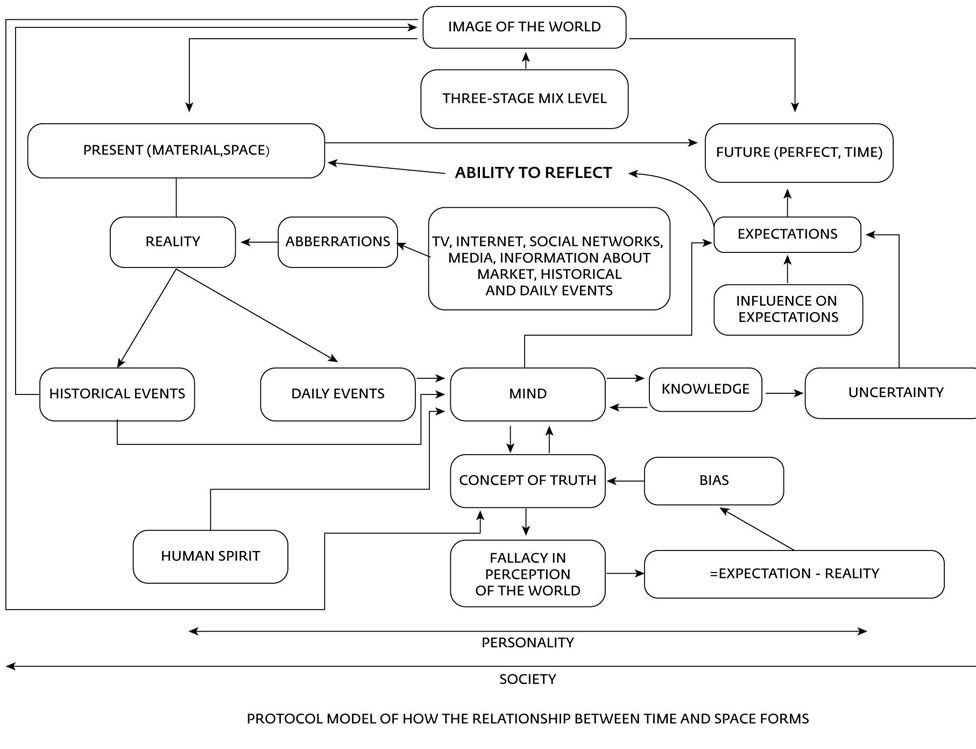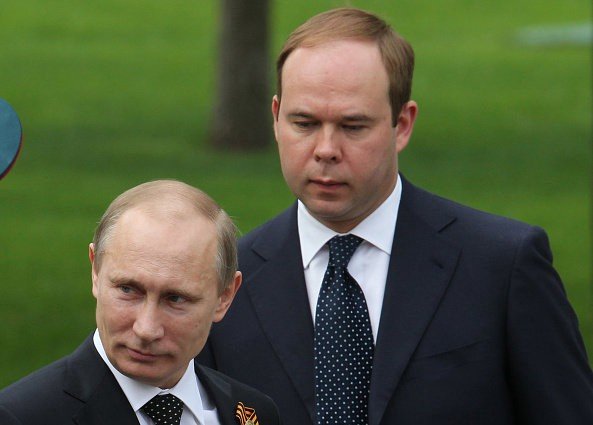17) Russian Cosmism and Putin’s spiritual eugenics
What happens when a world leader falls for crackpot philosophy? We’re going to examine a movement known as Cosmism, which appeared in late 19th century Russia and the early Soviet Union. It set itself the grand task of steering evolution to create immortal, cosmic superbeings. We’ll also look at how this fanatic philosophy influenced Putin, and may have helped inspire the Kremlin’s fledgling eugenics programme.
The idea of Russian supermen existed before Cosmism, of course. In Pagan Russian folk-tales, you find stories of shamans, witches and heroes who can draw on the spiritual energies in the universe to perform superhuman feats. In Russian Orthodox Christianity, one finds theory of divinization: humans can become God-like through mystical practice. One also finds the idea of the Tsar as divine emperor who will save the world by establishing a universal theocracy. And there is a centuries-old tradition of Russian esotericism, which included figures like Madame Blavatsky and Gurdjieff, who claimed they could draw down the energies of the universe to create a new race of god-men.
But Cosmism as a movement begins with Nikolai Fedorov, who lived from 1829 to 1903, working as a regional schoolteacher and then as librarian at the Rumyantsev library in Moscow. He was nick-named the ‘Socrates of Moscow’, because of his ascetic habits and his radical philosophy. He had one all-encompassing goal: the achievement of immortality and the resurrection of the dead.
This goal had previously been taken mystically when it should be taken literally. We should dedicate all our energy to conquering death. This ‘philosophy of the common task’ will unite all of humanity into one family with one goal. We should also then resurrect our ancestors, by a form of cloning which would recreate not just their bodies but their personalities.
When humanity has resurrected everyone who has ever lived, all 120 billion of us, we will need to expand to other planets. We must become ‘captain and crew of spaceship earth’, steering it like a ship through space. ‘Our entire earth is too small and insignificant; we must search for the means to live in other worlds.’ We will fill the lifeless universe with consciousness and joy.
Immortality is for everyone, but Federov believed there was a special role for Russia, as it fell to a divinely-appointed tsar to unite all of humanity into ‘the common task’.
Federov may sound like a crank, but he was held in high esteem by the literary greats of his day. Tolstoy visited him and deferred to him, Dostoevsky pronounced himself in agreement with his vision, and Vladimir Solovyov, perhaps Russia’s greatest philosopher, declared: ‘since the time of the appearance of Christianity, your ‘project’ is the first forward movement of the human spirit along the way of Christ.’
Solovyev pledged himself as Fedorov’s disciple and also called for a universal theocracy under a Russian Tsar, to hasten humanity’s ‘long and difficult passage from beast-mankind to God-mankind’. The next stage in evolution is to become immortal spiritual beings — only Christ has reached this stage so far, but all humanity will soon follow. However, Solovyov thought this spiritual evolution would happen through magical-spiritual means while Fedorov insisted on scientific resurrection. But both agreed that humanity would be saved by Russian theocracy.
Surely such a far-out philosophy couldn’t inspire Putin? Kremlinologists picked up what they thought was a reference to Federov’s magnum opus, when Putin in 2014 said:
We all want the same thing: well-being for Russia. So the relations between business and the state should be built on the philosophy of the common task
Also in 2014 (the year Putin first invaded Ukraine) he recommended Solovyev’s Justification of the Good to Russia’s regional governors. So these two may have played a role in his burgeoning vision of himself as a Tsar uniting the Russian people in a holy mission. But his Cosmist affiliations go deeper than that.
Cosmic eugenics
Federov’s most influential disciple was a young deaf serf called Konstantin Tsiolkovky, who turned up at the Rumyantsev library every day. Fedorov gave the peasant boy books to read, and imbued his young student with the dream of Cosmism.
Tsiolkovsky went to live in a log house on the outskirts of Kaluga, where he set about inventing how to send humans into space. ‘Earth is the cradle of humanity’, he wrote. ‘But one cannot remain in the cradle forever.’ Among his inventions were rockets propelled by liquid gas, airlocks, and pressure-resistant spacesuits — all of which proved fundamental to space travel. His writing directly inspired the work of Sergei Korolev, the mastermind behind the Soviet Sputnik programme.
Tsiolkovsky’s designs for airlocks and spacesuits
There is also an occult and fanatical aspect to his thinking. Tsiolkovsky (like Wells and Huxley) believed all nations should become a single political system governed by the most advanced specimens of humanity. Less intelligent life-forms should be eliminated, throughout the entire cosmos — a form of cosmic eugenics beyond even the Nazis’ wildest dreams. He wrote:
In a thousand million years nothing imperfect, such as contemporary fauna, flora and human beings, will be existing on Earth. Only the best will remain… in the cosmos there is no place for imperfect, suffering life: intelligent and advanced planets annihilate such life forms.
Tsiolkovsky in turn had a student in Kaluga called Alexander Chizhevsky, who became a Soviet biophysicist and a Cosmist. Chizhevsky (1897–1964) thought we needed to understand humans not just as ecological beings, but as cosmic beings. Our blood flows with the ‘veins of the cosmos’ and our heart beats with ‘the pulse of the cosmos’. Human history is profoundly impacted by the sun, Chizhevsky believed, and he worked out a theory correlating historical upheavals like the October revolution with solar flares. The world heats up, then revolutions happen.
A similar form of Cosmism was put forward by the biogeologist and Cosmist Vladimir Vernadsky (1863–1945). Vernadsky believed the Earth had passed through three stages — the geosphere, when the Earth was inanimate; the ‘biosphere’, when the Earth became a living ecosystem; and now the ‘noosphere’, when it became a conscious self-aware system. This is similar to the ideas of Julian Huxley and Teilhard de Chardin, who first used the term ‘noosphere’ — Vernadsky may have heard the word through a French friend of his. Like Huxley and Chardin, Vernadksy thinks human evolution has not finished, and that we will evolve into super-beings who (in his vision) will be able to directly photo-synthesize energy from the sun through our bodies.
Vernadsky influenced one of Putin’s favourite thinkers — Lev Gumilev, who we’ll examine shortly — and also Putin’s chief of staff, Anton Vaino. In 2012, four years before he was appointed to the Kremlin, Vaino published a paper claiming to have invented a technology called the ‘Nooscope’ which is ‘the first device that allows the study of humanity’s collective consciousness’. It sounds like bullshit — but that’s the point. Putin has become increasingly surrounded by cranks and conspiracists.
Anton Vaino and his plan for the Nooscope
The God-Builders
In the 1920s, Cosmist philosophy was taken up and put into practice by influential figures in the Bolshevik party, including Alexander Bogdanov, one of the founders of the party; Anatoly Lunacharsky, Soviet Commissar for Education; Leonid Krasin, the USSR’s first overseas banker; and the novelist Maxim Gorky.
This group has been described as the ‘Russian Nietzcheans’ — they were all inspired by Nietzsche, and his vision of the coming Superman. In Imperial Russia and the USSR, Nietzsche’s vision was taken up not as a project of individual self-fulfillment or as a project for the aristocratic elite, as it was in the West, but as a grand collective endeavour. The entire proletariat would join together in ‘God-building’ (bogostroitel’stvo).
The philosopher John Gray describes God-building as ‘a kind of secular mystery cult…The God-builders believed a true revolutionary must aim to deify humanity, an enterprise that include the abolition of death’. Anatoly Lunacharsky envisaged God-building as a new religion, to construct ‘the socialist humanity of the future. This is the only divinity accessible to man; its God is not yet born, but being built … God is the humanity of the future.’
This is similar to Julian Huxley’s vision of an evolutionary-eugenic religion to unite humanity. Like Huxley, Lunacharsky imagined the state using every propaganda means at its disposal to promote God-building. Lenin was briefly a fan of this idea, inspired by having read Tommasso Campanella’s City of the Sun, a Renaissance magical utopia where citizens are spiritually transformed through magic art, architecture and eugenics.
The idea of the evolution of a new species — homo sovieticus — was quite common in the early years of the USSR. Leon Trotsky wrote:
Man will make it his purpose to master his own feelings, to raise his instincts to the heights of consciousness, to make them transparent, to extend the wires of his will into hidden recesses, and thereby to raise himself to a new plane, to create a higher social biologic type, or, if you please, a superman.
One sees some parallels with Nazism, which also coopted Nietzsche and his dream of the coming superman. But there are differences between Soviet God-building and the Nazi programme to create superbeings. In Soviet God-building, one finds an obsession with achieving immortality that one doesn’t find in Nazism. Alexander Bogdanov, for example, experimented with extending longevity through blood transfusions. After 10 blood transfusions he claimed to have suspended hair-loss. His friend Leonid Krasin was equally obsessed with immortalization. At a friend’s funeral in 1921, he declared:
I am certain that the time will come when science will become all-powerful, that it will be able to recreate a deceased organism…And I am certain that when that time will come, when the liberation of mankind, using all the might of science and technology, the strength and capacity of which we cannot now imagine, will be able to resurrect great historical figures
When Lenin died in 1924, Krasin attempted to cryogenically freeze his body to prevent decomposition. It didn’t work, so he ordered Lenin’s corpse to be embalmed. He and Lunacharsky joined an ‘Immortalization Commission’ to create a mausoleum for Lenin. It was an intended as a holy shrine for Bolshevism, and a symbol of Lenin and humanity’s future resurrection. As the Party slogan declares in the poster below: Lenin Lived. Lenin Lives. Lenin Will Live Again.
What role did eugenics play in Cosmist or God-building thinking? Not a central one, certainly not in comparison to the role it played in Nazism. One finds it sometimes — in Tsiolkovky’s cosmic eugenics, for example, or the Cosmist philosopher Valerian Murayov, who called for a ‘cosmocratic government’ to create a new species of supermen in test-tubes. One of Julian Huxley’s students, the Marxist Nobel-prize-winning geneticist Herman Muller, travelled to the USSR in the 30s to try and persuade Stalin to introduce a ‘genius sperm bank’ to raise the general IQ levels of Soviet citizens.
But eugenics never took off in the USSR under Stalin. It was seen as a bourgeois science, that looked to the past rather than the future. Stalin preferred Lamarckism (an alternative theory of evolution) which suggested that through will-power and social changes, you can alter your DNA and pass on the alterations to your children. That became official state policy, and the USSR became the first state to end its eugenics programme in 1931. It’s only in the last few years that Russian eugenics seem to be making a comeback.
Cosmism since fall of USSR
Since the fall of the USSR, Cosmism has enjoyed a revival. Russian scientists have dedicated themselves to the project of life extension and eventual immortality. Danila Medvedev, for example, has worked on ‘mind upgrades’ using computer technology. He also started a cyrogenic freezing facility with his wife — when the couple divorced last year there was a legal tussle over control of the 81 frozen corpses.
Russian research into immortalization has been taken up in California, and also funded by oligarchs at home who are eager to stave off death. For example, in 2012, billionaire Dmitry Iskov launched ‘Russia 2045’, a project to make humans immortal.
Oleg Deripaska, one of the richest men in Russia, has donated money to discover the ‘elixir of youth’ at Moscow State University. Sergei Young, a Russian millionaire, launched the Longevity Vision Fund to extend human life to 200. Vladimir Brynstalov, a pharmaceutical tycoon, set up a personal rejuvenation laboratory to extend his life through stem-cell injections.
Putin hasn’t publicly supported immortalization research, though he does seem to have had botox injections, and it’s been reported by CNN that he bathes in blood from deer antlers (a popular rejuvenation technique in Russia).
Lev Gumilov and Russian spiritual eugenics
But Putin has publicly supported the neo-Cosmist theories of a Russian geographer and ethnologist called Lev Gumilev (1912–1992). Gumilev developed a bizarre Cosmist theory that ethnicities and civilizations rise and fall according to their ability to absorb energy from outer space. He called this ‘passionarity’. Some historical figures are mutant ‘passionaries’ with an unusual capacity to channel cosmic energy — Gumilev gives examples like Alexander the Great and Napoleon. But they can do nothing unless they lead a ‘super-ethnos’ which also has abundant cosmic energy.
Gumilev thought that every ethnos follows a cycle of creation, rise and decline. When different ethnic groups encounter each other, they usually compete until one is annihilated. They shouldn’t mix or inter-breed — this produces ‘chimera’ ethnic groups without identity or energy, who worship the ‘vacuum’ rather than the ‘life force’. He particularly criticized Jews as a parasitic ethnos. Gumilev, a nationalist patriot, believed the Russian people were a uniquely energetic ethnos, thanks to their Eurasian mix of western and Asian heritage (he doesn’t explain the contradiction that ethnic mixing is usually fatal, while in Russia’s case it’s the source of their strength).
Gumilev has become a ‘cult figure’ in Russia since his death in 1992. He gave Cosmism an ethnic and racial angle which appealed to post-Soviet Russians Among his fans is president Putin. In 2016, in his showpiece federal address, he said:
the coming years will be decisive. Who will take the lead and who will remain on the periphery and inevitably lose their independence will depend not only on the economic potential but primarily on the will of each nation, on its inner energy, which Lev Gumilev termed passionarnost: the ability to move forward and to embrace change.
He has compared civilizations to volcanoes, some dormant, some active, and claimed the Russian ethnos is still an active volcano in comparison to dying Europe. And in February 2021, Putin declared:
I believe in passionarity, in the theory of passionarity … Russia has not reached its peak. We are on the march, on the march of development…We have an infinite genetic code. It is based on the mixing of blood.
Perhaps Putin sees himself as a ‘passionary’ — a Cosmic mutant superhero with unusual intergalactic energy capable of uniting and guiding the ‘super-ethnos’ of the Slavic people. Certainly, he thinks of Russians, Ukrainians and Belarussians as ‘one people’ — as he put it in the essay he published before the 2022 invasion.
He also seems to believe that the West is trying to attack the Slavic people genetically. In 2017, he said that foreign powers ‘collect biological material all over our country, of various ethnic groups, people living in different geographical points of Russian Federation, they do it purposefully and professionally’. The following year, he spoke of ‘very dangerous’ biological weapons which target ‘certain ethnic groups selectively’. Since the war began, the Kremlin has repeated the idea that the US is funding biolabs in Ukraine to develop bioweapons that can target specific ethnicities.
This weird racial-eugenic conspiracy theory seems to have emerged from his friendship with the Kovalchuk brothers. Yuri Kovalchuk is one of his closest friends and advisors, who has been called the second most powerful man in Russia. Kovalchuk has a mystical-conspiritualist worldview, as does his brother, physicist Mikhail Kovalchuk, who Putin appointed director of the Kurchatov Institute in 2005.
In a speech in 2015 (translated here and shown in Russian here), Mikhail Kovalchuk — one of the most powerful scientists in Russia — suggested the American agency DARPA is creating new breed of subhuman ‘service people’ with ‘limited self-awareness’. Putin also said in 2018 that ‘people will be able to create a new human with programmed characteristics, soon’.
A slide from Kurchatov’s speech showing his idea that foreign powers are creating ‘servant people’
In the same speech, Mikhail Kovalchuk shared the conspiracy theory that the Western elite is actively trying to lower populations around the world, including by spreading gay propaganda. He said:
the next thing is the actual reduction in the birth rate by introducing into the mass consciousness ideas that contradict the natural ones. We are talking about LGBT people, about families without children and everything else.
Putin also said, in 2013, that same-sex marriages were causing western civilizations to die out:
The birth rates are low, the Europeans are dying out; do you understand that or not? Same-sex marriages do not produce children
These paranoid fears of foreign attempts to destroy the Russian ‘ethnos’ have led Putin to fund various ‘biodefense’ projects, including a $2 billion project launched in 2020 at the Kurchatov Institute, led by his daughter Maria Vorontsova, to research the ‘Russian genome’.
The very title reveals the strange blending of race and genetics — you wouldn’t research the ‘British genome’. It’s not clear what the project will do — it has been reported it will map Russian genetic characteristics and seek to ‘correct defects’. One notes that the only scientist to publicly say they plan to create CRISPR-edited babies is a Russian, Denis Rebrikov.
In 2013, Putin said Russia was still searching for a ‘national idea’, and in some ways what’s happening in Russia shows the danger of preferring mystical ideas to reality. As in Trump’s America, we’re seeing what happens when pseudo-scientific ideas and conspiritualist theories become state policy. You end up with a broken-down state and military, led by an ego-inflated ‘divine tsar’ with one spiritual idea seared into his mind: the unification, protection and enhancement of the Russian ‘super-ethnos’. Everything and everyone must be sacrificed to this ‘common task’.










